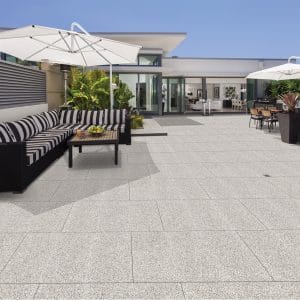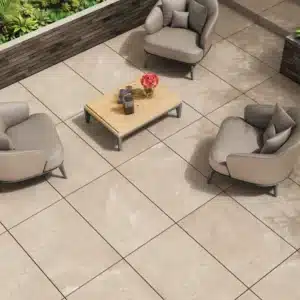Cemento Grey Vitrified Porcelain Paving
The Cemento Grey color of the paving is a stylish and sophisticated choice that can complement a wide range of architectural styles. The grey color is neutral and versatile, making it a great choice for both traditional and contemporary designs. Additionally, the color is timeless and will not fade or change over time, ensuring that it will continue to look great for years to come.
Cemento Grey Vitrified Porcelain Paving is also easy to maintain and clean. The non-porous surface does not absorb liquids or stains, making it easy to wipe away dirt and grime. Additionally, it is resistant to moss, mildew, and algae, eliminating the need for ongoing chemical treatments.
Another benefit of using Cemento Grey Vitrified Porcelain Paving is that it can help to create a sense of continuity and flow in outdoor areas. The grey color is neutral and can help to tie different elements of a landscape together, creating a cohesive and polished look.
conclusion :
We have the Best Cemento Grey Vitrified Porcelain Paving to offer you. It is a durable, stylish, and low maintenance option for outdoor paving. The grey color is neutral, versatile, and timeless making it a great choice for a wide range of architectural styles. Additionally, the high-quality porcelain material is resistant to wear and tear and easy to maintain. It can help to create a sense of continuity and flow in outdoor areas and is definitely a great option for any outdoor paving project.
You can also check out our related products lake pearl white vitrified porcelain From here
Slip Resistant – Stain Resistant – Frost Proof – Fade Resistant – No Maintenance Required!
Suggestions laying with adhesive on a Screed
1 Apply the adhesive spreading two layers, one on each surface (on the tile and on the foundation).
2 Arrange gaps of 3-5 mm between the tiles using the cross spacers provided for this purposes.
3 Upon completion, clean the surface thoroughly removing all residues of plaster and adhesive.
Suggestions laying dry on Grass
1 Once the positions of the tiles have been decided upon, remove the grassy surface for a depth of about 5 mm.
2 Place a layer of fine gravel or sand in the empty space to level it & stabilise the tile.
3 Position the tile, checking that it is flat and correcting this if necessary
Suggestions laying dry on Gravel and Sand
1 Flatten the surface of the foundation with the help of a levelling bar.
2 Choose the pattern, arranging the tiles on the ground.
3 Position the tiles exactly, using a bar to space them out (or cross spacers if positioned close together) to improve the alignment.






